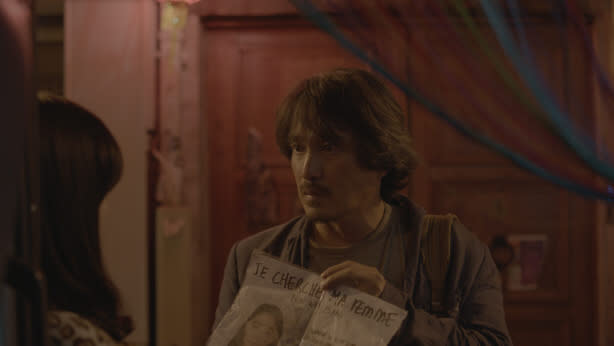Busan Film Review: ‘A Korean in Paris’

Even without the renewed media attention to the plight of migrants and minorities abroad, or the undying currency of art films about the lives of vagrants and prostitutes, there would be a sad, timely resonance to Jeon Soo-il’s “A Korean in Paris,” a steadily absorbing portrait of a man trawling the ugly lower depths of one of the world’s most beautiful cities. While it initially threatens to be little more than a bleak study of a drearily impassive protagonist (played by Cho Jae-hyun), the one-man drama turns out to be anything but one-note, increasingly blurring the line between tragic reality and surreal fantasy as its stolid, determined hero takes on an increasingly Beckettian stature. The film’s unhurried pacing and moments of explicit sexuality will limit its exposure, but more festival bookings await.
South Korean director Jeon has built up a resume of existentially gloomy, resolutely uncommercial fare including “My Right to Ravage Myself” (2003) and “Himalaya, Where the Wind Dwells” (2009), and it’s unlikely that the cross-cultural despair of “A Korean in Paris” will cause much more of a ripple. But the film’s acute insights and crystalline images (lensed by d.p. Kim Sung-tai) exert a slow-building power as it sticks close to Sang-ho (Cho), an unkempt, disheveled-looking man who has spent the past two years living on the streets of Paris. By day he rides the metro and wanders along the Seine, occasionally pausing to urinate in the river or vomit up the remains of last night’s excessive boozing. By night he becomes a figure of surprising purpose, visiting the side streets frequented by (mostly Asian) prostitutes and approaching each one he sees in turn — not to proposition them, but to show them a photo of his wife and ask if they know or recognize her.
How exactly she would have ended up here is hinted at in a lengthy flashback, in which we see Sang-ho (looking not just two years but two decades younger) and his wife, Yeon-wha (Pang Ji-in), on their honeymoon. These are happier and certainly less impecunious times: We first see the couple riding atop a tourist bus, and later they retire to a hotel room with a view of the Eiffel Tower (one gorgeous shot juxtaposes their lovemaking with a reflection of the street below). But all is not completely well with Yeon-wha, who seems sexually voracious yet emotionally distant, and develops a strange curiosity about the prostitutes she sees on the street. When she vanishes without a trace one afternoon, Sang-ho suspects she may have been kidnapped, though the suspicion lingers that she willingly succumbed to the city’s underworld.
Jeon’s attempt to probe the tortured psychology of female sex workers is admittedly one of the film’s less effective elements — particularly when Sang-ho shares the story of his missing wife with Chang (Mi-kwan Lock), a tall, striking prostitute who clearly appreciates connecting with someone who isn’t just another john. There’s poignancy in that development, and in the physically and emotionally violent moment when Sang-ho betrays the chaste parameters of their relationship. But the story veers toward exploitation and self-parody with what is either an unsimulated or a very convincingly simulated sex scene between Chang and an older French customer, in which she pauses mid-blowjob to announce, rather unnecessarily under the circumstances: “I am a whore.”
A similarly cruel streak emerges when Sang-ho ill-advisedly attempts to prostitute himself at a porn theater and finds himself the victim of a gay bashing. The abuses and deprivations of the life we see here require no such brutal emphasis, and as it progresses, “A Korean in Paris” dares to balance misery with compassion, pointing out the good Samaritans encouraging the prostitutes to fight for their rights, or the kind man who looks out for Sang-ho at the homeless shelter he occasionally visits. Without doing much to vary his expression, Cho nonetheless conveys a subtle emotional progression, as he’s continually reminded of the inhumanity of his environs and awakened to the occasional intimation of grace.
In the final passages Sang-ho’s search for his wife suddenly intensifies and he heads toward Marseilles, along the way meeting other immigrants from far-flung corners of the world and partaking of their hospitality. Increasingly he comes across as the improbable hero of a morose fairy tale, a white knight on a quest for a damsel who seems well beyond the point of rescue. Dream begins to blur into reality, and it becomes unclear if what we’re seeing is actually happening, or if it’s merely a byproduct of too much cheap liquor. No one even remotely familiar with Jeon’s oeuvre will be surprised to find the destination a sad one, but the journey this time around is not without its strange, desolate beauty.
Get more from Variety and Variety411: Follow us on Twitter, Facebook, Newsletter
